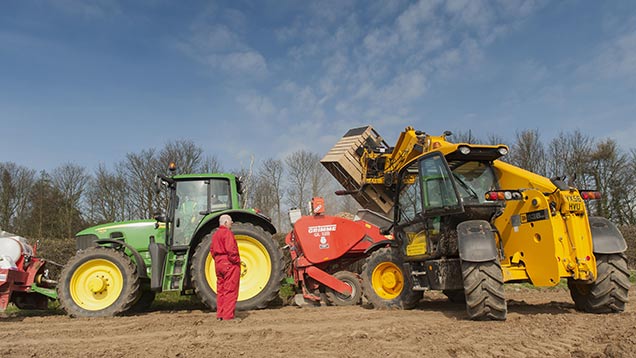Share-farming ‘matching service’ to inspire new entrants
 ©FLPA/Wayne Hutchison/Rex Shutterstock
©FLPA/Wayne Hutchison/Rex Shutterstock A national share-farming “matching service” to bring retiring farmers together with aspiring new entrants is set to be launched in 2016.
The project, led by Fresh Start Land Enterprise Centre (FSLEC), aims to match older farmers with young farming entrepreneurs to create new businesses, joint ventures and sharing of land.
A pilot matching service is due to be launched in early 2016. If the pilot is successful, as expected, the project will be rolled out nationally.
See also: Farm succession – how to start the conversation
FSLEC has been working closely with industry partners, the Country, Land & Business Association (CLA), the National Federation of Young Farmers’ Clubs (NFYFC) and the Royal Institute of Chartered Surveyors (Rics) to scope out the new project.
Funding for the scheme to progress was paramount and the Prince’s Countryside Fund (PCF) this week announced a two-year commitment to the project, providing £50,000 in funding.
The service will also receive further funds and support from the Frank Parkinson Agricultural Trust.
Alison Rickett, managing director for FSLEC, said: “There has always been a demand for a matching service from entrepreneurs looking to start farm businesses, but they needed access to land and a variety of innovative business models to progress.
“Real alternative routes to setting up a business can now be considered and this will be helped considerably with the funding.”
Christopher Price, CLA director policy, said: “Share farming agreements help older farmers to retire gradually, without losing their status as a farmer, meaning they can retain the ability to participate in the business.
“For young farmers wanting to get into the industry, share farming is a possible way forward.
“Share farming is such a personal relationship, it’s not just about putting two people together.
“You have got to ensure you are pairing up with the right person and that requires a facilitator and some resource has to go in to it.
“We are currently working with Fresh Start and others to see what can be done for the matching service. Hopefully, we will have something set up by the end of the summer.”
The final format for delivery of the project will be addressed over the coming months along with suitable building of data and IT systems and training to support it.
For more information see the FSLEC website
Case studies
David Wynne Finch
Vice-chairman of CLA Cymru, David Wynne Finch, farms on the Lleyn Peninsula in north Wales and has embraced share farming as a way of encouraging the next generation of talented people into farming, regardless of background.
“A big problem in the UK has to be the lack of openings available to new talent,” he said.
“With herd size average rocketing from 30 cows in 1973 to 115 now and forecasted to grow to 460 by 2053, the equity involved in dairying makes it impossible for anyone other than by inheritance to be drawn into it.
“Every year it is getting more and more difficult to get onto the first rung of the ladder and the industry is suffering and losing out on the potential of so many great people that we have here in Wales.
“This dynamic growing industry needs to attract the right people. It needs the best people and they need motivating. It shouldn’t be about who they are, what their net worth is – it should be about their attitude, their passion, and their ability.
“By working in partnership through the system the really hard working, good ones can get to own their own farm.”
But Mr Wynne Finch stressed that the secret of a successful partnership lies in the attitudes of the people involved.
“There has to be trust, integrity, technical excellence and an understanding of the win/win principle,” he added, pointing out that having a sound agreement in place is of course important, although he admits it’s not worth the paper it’s written on if the other qualities are not met.
“Wales has a great opportunity to reap the benefits of the growing demand for milk worldwide. Just like New Zealand, Wales has a great climate to grow lots of grass, feed lots of cows and there are plenty of young, keen talented individuals,” he said.
James Small, Somerset
Somerset farmer James Small farms a 405ha mixed grassland farm in the heart of the Mendip Hills in partnership with his family.
For the past four years the business has share-farmed a flock of 1,400 Beulah ewes with Sue Hartley.
While the family partnership retains ownership of the land and stock, Ms Hartley is the registered keeper of the flock and is responsible for its healthcare as well as all labour.
There is a standalone bank account for the share farming business which all income is paid in to and out of which all costs are paid.
Profits from the business are split between the family partnership and Sue on a 50-50 basis.
Mr Small said: “Sue gets on with the day to day running of the flock and we have regular management meetings to make sure that we’re both happy with the way the business is performing and the direction we’re moving in.
“The key to a successful share farming agreement is a fair and equitable decision making process between both parties.
“We have an equal say in the business and so there are no major decisions taken unless we are all in agreement.
“If a landowner is willing to approach share farming on a truly equitable basis and can have an honest and open working relationship with the farmer they’re working with, then it is a great option.”
